What My Fear of Flying Taught Me About Justice and God
BY BRENNA DAVIS | February 20, 2020
As much as I don’t like to admit it, fear is a big part of my life. As I write this, I am taxiing on an airplane for takeoff—and flying is one of my biggest fears of all. I don’t know how fear snuck up on me like this. I remember a time not so long ago when danger did not cross my mind. Flying internationally, no big deal. Writing something for a large group of people to read, not a problem. Biking though my neighborhood alone at night, of course. But now in my early 30s, I find myself fearing so much more.
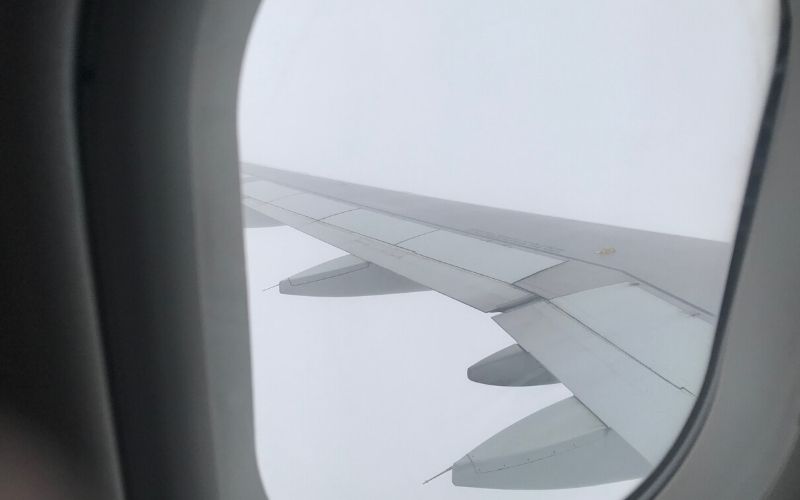
View from my seat as we hurtle through the air and the (not so sweet but rather nerve-shatteringly bumpy) clouds at hyperspeed without so much as a brake pedal or steering wheel at my disposal.
Maybe it’s a natural consequence of growing older while also seeing family and loved ones do the same. The fragility of life takes on a new meaning as each moment, day, month, and year passes.
Maybe it’s a natural consequence of being acutely aware of our environmental situation. As a young person with no children, I fear deeply for future generations, even if they are not filled with my own personal descendants. I fear for everyone who is still alive in 20 or 30 years who will have to deal with the consequences of our actions and unwillingness to face the reality of the information we have today. I fear for anyone at this moment who is suffering from the consequences of injustices present in our world, ecological or otherwise.
I’m working on environmental issues. I’m flying to do work on environmental issues, which is, by far, the least fuel-efficient mode of transportation. I’m trying to be part of the solution while also being a part of the problem. I fear that the work I do will not make a meaningful enough impact to justify the emissions I’m using to do it.
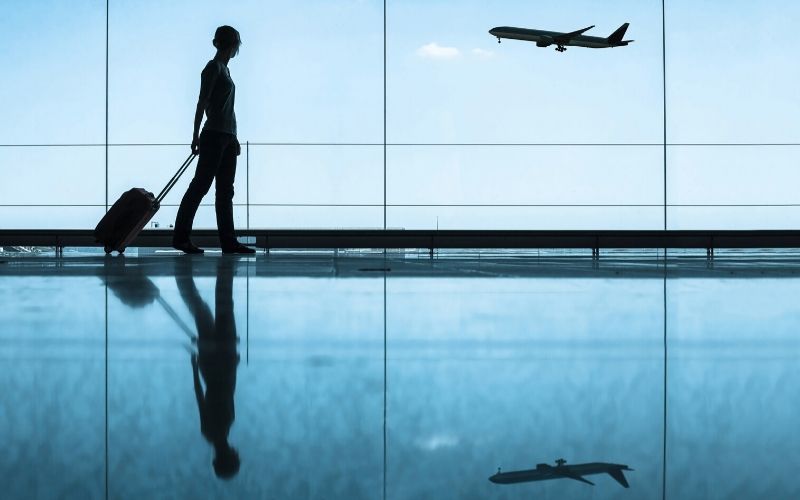
“I fear that the work I do will not make a meaningful enough impact to justify the emissions I’m using to do it.”
And it’s this fear that drives me and simultaneously paralyzes me in my work and personal life. The environment, sustainability, and conservation are the lenses through which I see the world. There is a beauty in that, but there is also a burden and a challenge. I don’t want to be so afraid.
We’re going through the clouds now, and the turbulence has begun (Side note: does anyone dislike clouds as much as me when you’re in a plane? They’re so beautiful from the ground, but when you’re in them it’s MUCH less enjoyable). My fear in this moment comes from thoughts of future airplane catastrophe. My fear in this moment comes from thoughts of future environmental catastrophe. I am not driving this plane or the environmental policy of the United States, and I don’t like the feeling that I’m not in control.
I don’t have a solution to this fear, but I know it’s not a place I want to live. I find much more energy and creativity coming from a place of love. Recently I had an experience on a silent retreat that gave me a sense of release and peace, and that’s what I want to share in case you’re fearful too.
There is a phrase from the Bible (I’ll look up the exact citation later when we’ve landed and it’s safe to turn on WiFi—I take my duty to help the plane arrive safely quite seriously) that uses the phrase “in the fullness of time” (Note: It’s Ephesians 1:10). In my prayer, that phrase gave me such a deep heart-felt sense of consolation.
The fullness of time, a time when God will gather up all things in heaven and on earth and no one will be left out. The time when justice will reign on earth. This phrase gives me a sense that there is a richness to eternity that I cannot fully understand now because I’m in such a small (yet important) piece of it.
This phrase made me think of 9th-grade theology class when we read Mere Christianity (I will have to check this citation when we land as well) and C.S. Lewis spoke about time as a mountain range. I can only see the small piece of the mountain because I’m on it, but God, the force that sustains everything, can see the entire mountain range at once. That doesn’t mean I or we won’t collectively fall off of a cliff, but I oddly find comfort in the idea that in the fullness of time it will all be ok. (Future Brenna here. It looks like he actually used the image of an author who takes breaks in writing to describe time, but I still wanted to share the mountain image from my memory because it’s still meaningful to me).
James Finley, a mystic of our day, used this story on a retreat I attended when a participant asked about how to be contemplative in the midst of suffering. I’m heavily paraphrasing, but when you’re 30,000 feet in the air, it’s allowed. He asked us to imagine a mother holding and trying to comfort a crying baby. The mother says to the baby, “It’s ok… everything is going to be alright.” In one sense, this is not true at all. The baby will most likely grow up, experience the suffering and injustice of the world, and die. But in another sense, the reality underlying all life is that everything is ultimately going to be ok. The mystics and gospel tell us this again and again.
“All shall be well.” – Julian of Norwich
“Let nothing disturb you.” – St. Teresa of Avila
“Do not be afraid.” – Jesus (If I remember correctly, this is the phrase Jesus says most frequently in the New Testament).
We are still in the clouds, and I cannot see anything. I must trust.
The fullness of time is not yet fully here, but we can see it in small glimpses if we slow down enough. Or sometimes they even sneak up on us. The way the early morning or afternoon light filters through the trees. The laughter of a child. Squirrels being squirrels. Staring at the ground from 30,000 feet. They’re all miracles. Merton refers to this as the cosmic dance. Oddly there is something so special about each of these moments that on the deepest level of my being lets me know that everything will ultimately be ok even while I know that everything is not ok right now.
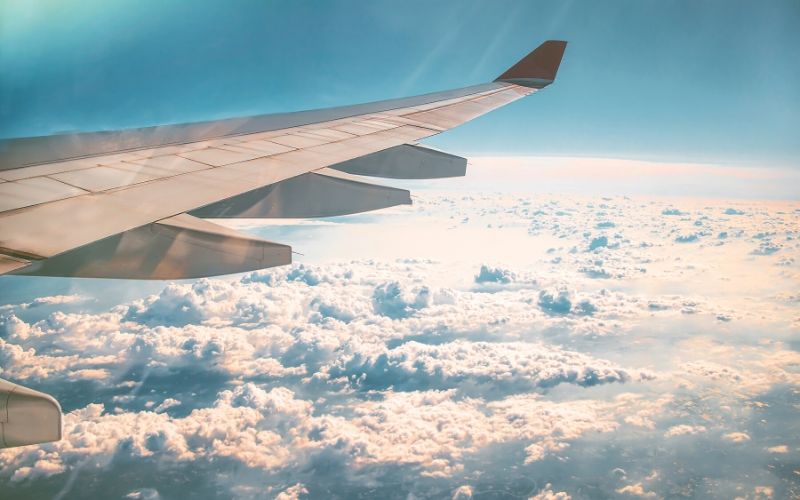
Staring at the ground from 30,000 feet is a miracle and can be a glimpse of the fullness of time if we allow it.
Experiencing the fullness of time does not let us off the hook in taking concrete action for environmental justice or any other justice issue in the present. If nothing else, it compels us to go deeper. If we know that there is goodness underlying each moment, we should be stirred ever more deeply to transform our world into one in which each person not only has their basic needs met, but also can flourish and have the space and safety to delight in the fullness themselves. (That’s not to imply that the fullness of time doesn’t exist in places where people experience suffering and injustice. Many stories of goodness and love have been shared from people caught in the midst of war, at the U.S.- Mexico border, and so on throughout history. God’s fullness is deeply present in these places and can be experienced by anyone open to it).
It does, however, take some of the pressure off, not the urgency to act, but the pressure and fear that tempt me to give up or to freeze. St. Ignatius might call this “the enemy of our human nature” or “the evil spirit.” I’ve always had issues with these phrases because they bring to mind images of a small devil, a Screwtape type figure, but in this context, it makes sense to me—the fear that limits me or tempts me from doing my piece of work in the world.
Attempting to see the world as God does, through the fullness of time, helps me to remember why I most deeply care about these issues. People are good, creation is good, and none of us did anything to make ourselves exist so we are called to help each other live as fully and fruitfully as we can in this life.
“We are all just walking each other home.” That’s Rumi, I think… (Brenna from the future here again, that’s Ram Dass, not Rumi.)
So to sum this all up, I don’t know the future—and I often fear for a future that I cannot see. I also hope for a future I cannot see.
There isn’t really a call to action here, but I do hope that an honest look at fear and the underlying reality of all things—God, the fullness of time, that all manner of things shall be well—is a helpful reminder as you navigate the fears that tempt you to forget the goodness that exists at the foundation of everything, the love that sustains us and that is as close as our next breath, God. This is more easily said and seen when you’re not in the midst of suffering, but I think if we can explore the fullness of time in the context of our daily lives it may carry over when suffering strikes.
Finley also describes God (again, as I remember it in my mind) as the one who “protects us from nothing but sustains us in everything”. What I’ve written here doesn’t mean that bad things won’t happen, that injustice won’t exist, or that climate catastrophe won’t kill many species and people. It does mean that we are held in love in the midst of it all and that we’re called to hold each other as we journey together towards the fullness of time. The times when we do that create a glimpse of the fullness that we have not yet experienced.
I hope this gives you some encouragement as you engage in your work for justice, and I thank you for giving me a purpose and distraction during my flight, which is usually filled with fear. We’re about to land.
I pray that all of our work and our way of being can help to make the fullness of time as present as it can be in each next present moment of our earthly pilgrimage.
(Author’s note: We made it.)
Brenna Davis is director of Education for Justice and environmental initiatives for the Ignatian Solidarity Network. She graduated from Boston College in 2010 and served in Cleveland as a Jesuit Volunteer. She previously taught theology, coached cross country, and served as main office coordinator at Saint Martin de Porres, Cleveland’s Cristo Rey High School. During her time there she was the self-proclaimed assistant to the director of facilities in all sustainability initiatives on campus. She is a certified spiritual director and a Cuyahoga County Master Recycler.

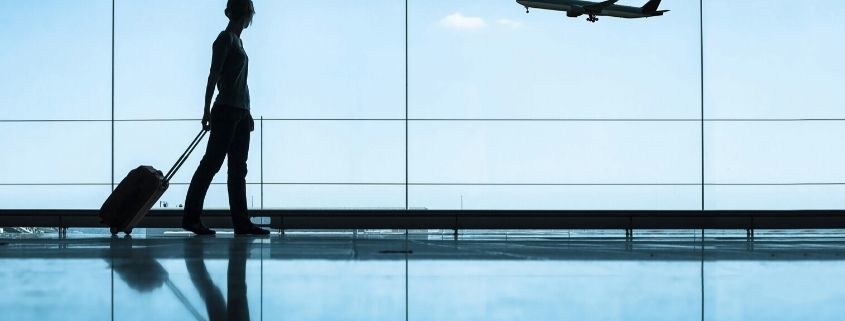
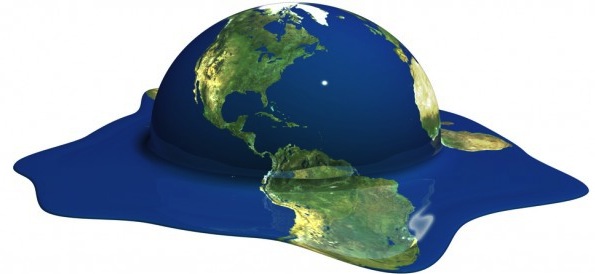
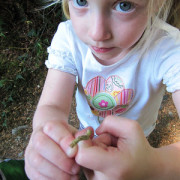

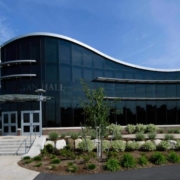
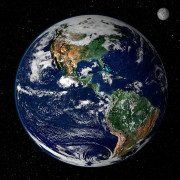
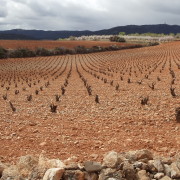

Fear not, for I am with you till the end of time – says the Lord.